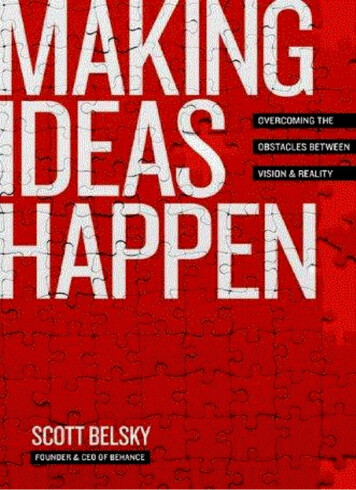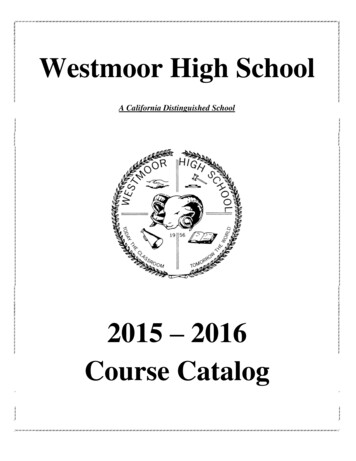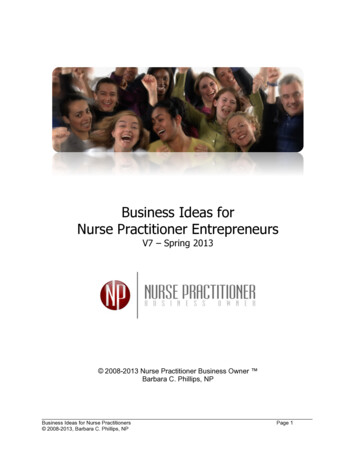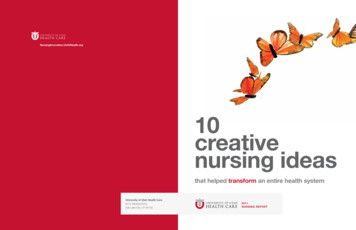
Transcription
The History and Ideas of Marxism: The Relevance for ORAuthor(s): R. J. OrmerodReviewed work(s):Source: The Journal of the Operational Research Society, Vol. 59, No. 12 (Dec., 2008), pp. 15731590Published by: Palgrave Macmillan Journals on behalf of the Operational Research SocietyStable URL: http://www.jstor.org/stable/20202244 .Accessed: 29/06/2012 15:12Your use of the JSTOR archive indicates your acceptance of the Terms & Conditions of Use, available at ms.jsp.JSTOR is a not-for-profit service that helps scholars, researchers, and students discover, use, and build upon a wide range ofcontent in a trusted digital archive. We use information technology and tools to increase productivity and facilitate new formsof scholarship. For more information about JSTOR, please contact support@jstor.org.Palgrave Macmillan Journals and Operational Research Society are collaborating with JSTOR to digitize,preserve and extend access to The Journal of the Operational Research Society.http://www.jstor.org
Journal of the OperationalResearchSociety59,(2008)1573-15902008 Operational?Research Society Ltd. All rights reserved. 0160-5682/08www.palgrave-journals.com/jorsThe history and ideas of Marxism:the relevance for ORRJ Ormerod*Universityof Warwick, Coventry, UKThe paper examines the origins of Marxism in Europe in the second half of the 19th century in the context ofthe industrial and political revolutions of the previous century. The philosophical, economic, social and ethicalideas of Marxism are explained and critiqued. It is suggested that although many of Marx's predictions haveproved wrong and the application of his ideas often disastrous, his concern for the exploited and his emphasison the dynamic of change still has relevance today for OR. The paper explores where that relevance lies andhow advantage might be taken of the insights Marx's analysis of society offers.Journal of the Operational Research Society (2008) 59, 1573-1590. doi:10.1057/palgrave.jors.2602495Published online 3 October 2007philosophy of OR; history of ideas;Marxism; process of ORKeywords:Introductionsuggests whereThis is the second in a series of papers that describes the history and ideas of major intellectual movements and explorestheir relevance for OR today. The first paper took as its subject pragmatism (Ormerod, 2006). The current paper examinesMarxism, the philosophy, ideology and social theorizingof Karl Marx and his followers. Isaiah Berlin concluded that,'no thinker in the nineteenth century has had so direct, deliberate and powerful influence upon mankind as Karl Marx'(Berlin, 1948, p 1).Marx lived at a time of social unrest andnationalisticfervour.Hewasa revolutionaryandsoughtcreate an intellectual framework to support workersintent.revolutionaryTheframeworkwasto be basedtoin theiron a scientific understanding of the historical development of the conditions of society and their inevitable consequences.Theseideas spread rapidly after his death; by the second half of the20th century much of the world was governed by communistregimesformsofbasedon he West,otherareregimesnow losing political control of countries they once dominated.However,thisdemiseis byno meansuniversaland Marxismcontinues to be influential in the world of ideas.Marxism has featured in a number of OR publications aboutthe nature and role of OR and has been claimed in supportof some methodologies;but most practitioners reject Marxistideologyas wrongheaded,extremeortoodestructive.However, there is a danger of losing sight of Marx's innovativeattempts to theorize about society: how did he go about thisdifficult task and what conclusions did he reach? The paperoffers a brief account of the development of Marxism andRJ Ormerod,26 Coulsdon*Correspondence:EX10 9JP, mouth,DevonThepapercanits relevance mightalsobereadas anlie for OR practitioners.introductionto onesourceof critical thinking, setting out Marxism'sroots and consequences, its merits and limitations. From an OR perspectivethree questions are addressed. How can OR be understoodtoday from aMarxist perspective? What are the implicationsideas for the practice of OR? How can Marx'sofanalysissociety be utilized within an OR intervention?Marx was one of the first social analysts to work with theof Marxistideas of Enlightenment writers, attempting to combine thephilosophical and empirical traditions into an overall structure of thought that makes theoretical sense and is empirically rooted. His theoretical approach combines observationand reason, and many of his conclusions can be subjectedto empirical tests. Marx's system combines a philosophicalapproach (the dialectic) with an analysis of history (materialism) and politics (socialism) and integrates these into an overallsystemofpoliticaleconomy,rootedin theeconomicsofSmith and Ricardo. This theoretical framework provides anexplanation for the economic, social and political structuresof society and how they change (Gingrich, 2006).Marx set out his intellectual framework in his book DasKapital, Volume I (Marx, 1867) was published in his lifetime,Volumes II and III being completed and published by hiscollaborator Friedrich Engels after his death. The originaltexts of Marx (and his collaborators) are, on the whole, directand easy to comprehend. Marx and Engels set out the mainthrust of their revolutionary intent in the Communist Maniis assertive,(Marx and Engels, 1848). The manifestoargumentative, and fizzles with revolutionary zeal. Its mainmessage was summarized after Marx's death by his daughteras follows:This manifesto opens with a review of the existing conditions of society. It goes on to show how gradually the oldfesto
Journal of the Operational Research Society Vol. 59, No. modernRhineland,of the capitalsociety is divided simply into two classes?thatists or bourgeois class, and that of the proletariat; of the expropriators and expropriated; of the bourgeois class possessingwealth and power and producing nothing, of the labor-classthat produces wealth but possesses nothing. The bourgeoisie,after using the proletariat to fight its political battles againstfeudalism, has used the power thus acquired to enslave theproletariat' (Marx, 1883).The next sections of the paper introduce Marx and Engelsand describe the historical and social context of the time. Thefollowing four sections explain Marx's theories on philosophy,economics, politics and ethics. Subsequent developments andcriticism of Marxism are then described. Finally, the role ofMarxismin the development of OR in the UK is outlinedfollowed by a discussion of the implications for OR today.Throughout the paper use is made of various referencebooks withoutfurther citation including the Chambersthe Chambers Biographicalof World History,the Oxford Dictionaryand theof Quotations,In particular, use has beenOxford Companion to Philosophy.made of those entries in the latter that describe Marxism andthe contributions of its precursors, originators and subsequentdevelopers. (P Singer on Hegel; A Wood on Marx and Engels;D McLellan on Marxism; MJ Inwood on Hegelianism and theDictionaryDictionary,Frankfurton Habermas).and C Norrisschool;In researchingthe history and ideas of Marxism significant use is made ofBerlin (1948), Bottomore (1991), Carew Hunt (1950), Giddens and Held (1982), Gingrich (2006), Jay (1973), Rattansi(1982) and Tucker (2002). Fuller accounts of Marxism canbeinfoundtheseandcourse, in the writingsattractsMarxismNotagonism.othermanyof tcanaccounttextsstandardand Engelssidesofanfierceequallythe argument.The paper is intended to inform those not familiar with thesubject, and to stimulate interest by exploring the history entIt is in thisto drawthisargumentativesomeconclusionsas a dialecticalprocessandimpact,senseasomeMarxof whichwehe would approve without necessarilyitFurther,wouldcanpresumeapproving the synthesisand EngelsBerlinunder the in(changing from law to philosophy)of Ludwig Feuerbach (1804-1872),Bruno Bauerand the Young (or Left) Hegelian movement.(1809-1882),He completed his doctorate in philosophy in 1841 but imforcing(Marx and Engels, 1848). In the same year MarxManifestowas expelled from Prussian territories and after a brief spellin Paris he took up residence in London where he lived inpoverty (Berlin, 1948, pp 175-189). Throughout the 1850sand 1860s, when not confined to bed by illness, Marx regularly spent 10 h a day in the library of the British Museumstudying and writing. There he had access to the results ofParliamentary inquiries and the history of the introductionof factory legislation in Britain (which, for instance, limitedworkinghoursin nearlyall manufacturingorcottageindustries to 60 h per week for women and young people under18, and to 39 h for children under 13). These provided amplematerial spanning almost 40 years on the actual relationscapital and labour as they had reached inEngland (Engels, 1869).Engels hoped for a career in literature but his father, a textile manufacturer, insisted that he work in the family business.He was attracted to Young Hegelian radicalism while doingmilitary service in Berlin. After participating in the unsucexisting betweencessful Paris revolution of 1848, Engels moved toManchesterwhere he worked in the family business until 1869 and produced a series of writings on history, politics, and philosophy.After Marx's death in 1883 he devoted the last 10 years ofhis life to the posthumous publication of the second and thirdvolumes of Marx's Das Kapital (Capital). Engels acknowledged Marx to be the more profound and original memberof the partnership. He helped popularize the thought of hisfriend and extended it to the realms of science and philosophy. However, some of the principal doctrines identified withMarxismare moreThe historicalEngelsthan Marx.and social contextMarx's writing was strongly influenced by what he observedin 19th century Europe: the intellectual changes of the enlightenment, the technological developments of the industrial revolution, the political struggles in the aftermath ofthe American (1776) and the French (1789) revolutions, andthe developmentKarl Heinrich Marx (1818-1883) was the son of a successfulJewish lawyer of conservative political views who convertedto Christianity. He studied at the Universities of Bonn ue.for OR.Franceto leave. In 1844, while in Paris, Marx was introduced bothto the working-class movement and to the study of politicalIn 1848 Marxeconomy by Friedrich Engels (1820-1895).and Engels played a key role in founding the CommunistLeague and as part of its activities wrote the Communistthe governmentandMarx lost all chance of an academic career in philosophy.Between 1842 and 1848 he edited radical publications in theof globaltrade and empire dominatedbyEurope.The EnlightenmentMarx was born into a Europe whose intellectual landscapehad been completely reshaped by the Enlightenment.TheRenaissancein the 14th and 15th century and the Reformation in the 16th century, both vast and fundamental changesin western civilization, had paved the way for the Scientific Revolution of the 17th century and the Enlightenment ofthe 18th century (approximately bracketed by the 'Glorious
RJ Ormerod?The history and ideas of Marxismof 1688 and the French Revolution of 1789).Prior to the Enlightenment Europe was a theologically conceived and ordered regional society, based on hierarchy andecclesiastical authority and a culture rooted in the sacred,Revolution'andattackedand kinship. By contrast, the ture,Europeansecularized all institutions and ideas, and (intellectually, and to adegree in practice) effectively demolished all legitimation ofmonarchy,woman'saristocracy,to man,subordinationecclesiastical authority, and slavery. These were replaced with theprinciples of universality, equality and democracy (Israel,2001, p vi).the Enlightenment is depicted as a projecConventionally,tion of French ideas, especially those of Descartes, Bayle,Montesquieu, Voltaire, Diderot, D'Alembert, d'Holbach andRousseau. Another view casts the Enlightenment as an intellectual reorientation chiefly inspired by English ideas, especially those of Locke and Newton but also Francis Bacon,Bentham, Gibbon, Hume and Adam Smith. Given the importance of the German philosophers Spinoza and Kant and thecontribution of some Italian thinkers perhaps a better viewis that it was a pan-European movementFrenchHowever,was(Israel, 2001, p v).the pan-Europeanlinguaoffrancatheday, and the French 'philosophes' provided the distributionmechanism for Enlightenmentideas, aided by the new technology of printing.Jean Jacques Rousseau (1712-1778) madeimpassioned pleas for due weight be given to feelings and themoral sense (Roberts, 2002, p 694). In 1762 he publishedDu Contract Social (translated as A Treatise on the SocialContract) in which every individual is made to surrender hisrights totally to the collective 'general will', the sole sourceThe Genevanof legitimate sovereignty and by definition the common good.His text, with its slogan 'Liberty, Equality, Fraternity', became the bible of the French Revolution and of progressivemovementsgenerally. In it he says 'L'homme est n? libre,et partout il est dans les fers'?'Manis born free, yet everywhere he is in chains'.John Locke (1632-1704)taught that the mind at birth wasa blank sheet (tabula rasa) and that ideas were seforsociety'smoralontothe contentregulateandmaterialvaluesaroseFrom this manypain and of education,conditions(Roberts,1575and industrial revolutionAgriculturalHistorians of Britain classically apply the term industrial revThe steady advance ofolution to the period 1750-1850.the moreandagriculturedramaticof manufacdevelopmentturing industry gave rise to an increasingly wealthy, urbanized society geared to progress and change. Britain mainlyimported raw materials and exported manufactured goods.The rise in agricultural output and productivity resulted froma betterof husbandryknowledgeandenclosurerotation,cropof the open medieval fields with their narrow strips, and latterly from technical progress. The result was sufficient foodto sustain population growth, disappearance of the traditionalpeasant, and the availability of surplus labour to meet dustry. These improvements in agriculture spread to continental Europe. By 1850 peasants tied to the soil and obligatorylabour had disappeared from most of Europe, with Russiabeing the major exception (Roberts, 2002, p 708).Within a century and a half or so, societies of rivenbyintoandfrompowerof erandby mareplacedinExtractivedustries grew. Manufacturing became much more specializedand more productive (for instance, the Lancashire cotton industry). Industrialization implied new sorts of towns, newschools and new forms of higher learning; this resulted veryquickly in new patterns of daily existence and living together.The transformation was made possible by the gradual buildup of capital in earlier periods, the construction of canals andrailways, the accumulation of knowledge (including science),and the development of technology based on years of experienceofAllcraftsmen.during Marx'stheseweredevelopmentsunderwaylifetime.Trade and empiresof the capital required to initiate the self-sustaininggrowth of the Industrial Revolution had been accumulated Roberts,2002, p 560). Europe had produced wealth on an unprecedented scale; it dominated the rest of the globe as no previouscivilization had ever done. Much of this domination was political, a matter of direct rule; large areas of the world 2002, p 687) and on the relativity of knowledge and belief(beliefs depended on the experience of particular individuals). The new prestige of science seemed to promise that theobservations of the senses were the way forward to knowledge. There grew in European man a new confidence in thecountries, which were still formally and politically independent of Europe, most of them had in practice to defer to Eupower of the mind and a conviction that human knowledge,rationality, wealth, civilization and control over nature wouldprogress. The Enlightenment drew its strength primarily fromnew supplies of food from the USA, Canada, Australia, NewIn return these countriesZealand, Argentina and Uruguay.had an appetite for the goods being produced in the largenew factories in Europe. Commerce and Empire went micscientific rationality believed to be inevitably associated withboth (Hobsbawm, 1962, p 20).ropean wishes (Roberts, 2002, pp 697-698).The growing population of Europe wasemigration,advancesin agriculture,andsustainedthe openingofbyvastin hand, with the imperial country controlling the tradeflows and the ships they were carried in. The key to global
Journal of the Operational Research Society Vol. 59, No. 121576wasempireto establishand maintainnavalto protectpowershipping and to ensure ports were kept open fortrade. Not all colonies and countries acquiesced in this, someThe progressof historycommercialrevolted,in America.notablyPoliticalthe exception of Britain, which had its revolution in the17th century, Europe in the 18th century was ruled by absolute monarchs buttressed by hereditary nobles, the orthodoxyof the church, and other institutions. In the latter part of thecentury the obvious international success of capitalist Britishpower led most such monarchs (or rather their advisors) esocial,However,andsomedespitemonarchs adopting modernist and innovatory stances, they found itimpossible to break free from the hierarchy of landed nobles(there were some exceptions to this, Denmark for instance).What did abolish agrarian feudal relations all over Westernand Central Europe was the French Revolution (Hobsbawm,1962, pp 22-24). To prevent a second French Revolution ora general revolution on the French model was the supremeobject of all the powers which had just spent more than 20years defeating the first in the Napoleonic War. Neverthethereless,werewavesofrevolutioninthe westernworldbetween 1815 and 1848 (Hobsbawm,1962, pp 109-110).The biggest of these, that of 1848, broke out almost simultain France,neouslythe wholeofthe GermanItaly,states,mostof the Hapsburg Empire and Switzerland. There has neverbeen anything closer to the world-revolutionof which theinsurrectionaries of the period dreamt than this spontaneousandgeneralInconflagration.and heralded(Hobsbawm,thethe gigantic economic1962, p 112).The roots of Marx'sconcernedendit wasnotsuccessfulleap forward after 1851labourandsocialandfragmenlife produced by the divisionthebyato recreatehe rated community. In his view the true history of humankindis the history of consciousness,spirit, or philosophy. Eachhistorical era is distinctive and human society does progress.For Hegel, itwas important for individuals to be in tune withideasthesehistoricalofratherthanreverse.thefor MarxHowever,Hisan essentialbecameprogresshistory.rial and social factors?classand human labour?ratherofviewaspectcomesprogressandstagesof Marx'sviewmatefromstruggles, technological change,than ideas (Rattansi, 1982, p 27;Tucker, 2002, p 57).Hegel considered Germanic culture a higher and perhapsultimate synthesis of its predecessors, especially the culturesof Greece and Rome, and the most perfect political framework yet attained by men (Berlin, 1948, p 63). He arguedthat it was only philosophicallyeducated officials that possessed a developed insight into the unity of the individualhuman being and the state. In contrast, the Young Hegeliansheld that all citizens could acquire this, a much more radical view. They claimed that only the 'rational was real'; the'actual'is oftenfullofanachronismsinconsistencies,andblind unreason.They concluded that radical transformationmay be necessary in order to create institutions that are inaccord with the dictates of reason (Berlin, 1948, pp 63-64).The dialecticFor Hegelsocial, and individual change andphilosophical,development emerge from the struggle with ideas (Tucker,2002, pp 57-58); we develop understanding only through opposites, and knowledge develops through negation and conandThe major intellectual influences on Marx were Enlightenment ideas, German philosophy, the French socialists, and theEnglish and Scottish political economists. Marx synthesizedthese to develop a new system of thought (Rattansi, 1982,the disorganizationand socialpersonaltradiction.philosophyabouttation of lnotionofthesis,antithesis,In contrast,process.arMarxgued that the history of thought, ideas, and ideology werereflectionof developmentstalk of Marxin the materialasomeThusand standingdialectictaking Hegel'sworld.it on itshead.p49).On labourand Marx'sidealismHegel'smaterialismForWhen Marx was attending university in Germany the ideas ofGeorg Wilhelm Friedrich Hegel (1770-1831) were dominant.For Hegel, reality consisted inminds or ideas. Marx rejectedHegel's idealism preferring materialism,that views the social world as developingofhumanstothe naturalworld.a system of thoughtfrom the relationshipMaterialismexamineshowindividuals, groups, and institutions act and interact with eachother in social relationships. Hegel looked on class struggles(between lord and bondsman) in a very abstract manner, whileMarxsaw classes2002, pp 88-89).strugglingin the material world(Tucker,labourHegel,is a centralfeatureofhumanexistencethrough which man comes to know and understand his world;it is a liberating activity (Rattansi, 1982, p 29). Marx adoptsa similar approach; labour is essential to humanity in defining humanity (as opposed to non-human animals), and eIn looking at class relationships,productsoflabourarecrucial.(and human nature) is the purposefulthattransformsnatureintousefulobjectsthe useHumanand creativeandprovides the means by which humanity can achieve freedom.The problem with capitalism is that much of this potential isdeniedto workersandturnedagainstthem.
RJ Ormerod?The history and ideas of Marxismand alienationFeuerbachThe writings of Ludwig Feuerbachbecame(1804-1872)influential on Marx and the other young Hegeliansin 1841when The Essence of Christianity was published. Hegel sawthe real as emanating from the divine. In contrast, Feuerbachthat the divine is an illusory product of the real:thought proceeds from being, not being from thought. Thismeans that God is a projection of the inward nature of humans; religion is a projection of human wishes and a form ofalienation (Tucker, 2002, p 89). Feuerbach said that religionmust be replaced by humanism. What both Hegel and Feuerarguesbacha falsedamentallycorrectis adopted:itslaments,the perceptionofofa lament,consciousness,interpretationation becomesinwasin commonhadthe world.To Marx,as funalienationwhosecure wasaalienhowever,intelligible as soon as the reverse suppositionthat the alienated consciousnesstells the truthnotinitsconsolations.For Marx,religiousmisery is both an expression of actual misery and an attemptto flee from it into a world of imagination: it is the 'opiumoftheThepeople'.wayoutofalienationwasnota newphilosophical interpretation of life, but a new form of earthlyexistence, a new society in which the material conditions fora fulfilling human life would no longer be lacking. In hisTheses on Feuerbach No. 77 (1845) Marx says: The philosophers have only interpreted the world in various ways; ourtask is to change it.' Marx used the alienation of Feuerbachalong with the historical, dialectical and political approachof Hegel, to begin to analyse society, the state and politics.Frenchsocialists1577evils of society were due to competition, and that the remedywas the control of industry by the state. However unrealistictheir treatment of the future, the 'Utopian socialists' had madeimportant contributions to socialism; their analysis providedMarx with much valuable material; he borrowed a number oftheir ideas while dissociating himself from the specific remedies which they recommended.Marx'seconomicsMostof Marx's economic theories can be found in A Contribution to the Critique of Political Economy (Marx, 1859) andDas Kapital (Marx, 1867). Marx's economic system derivesfrom that of the classical school of British economists, whichcan be taken to start with the publication in 1776 of AdamSmith's Wealth of Nations. The British school had adoptedthe theory of value first outlined by John Locke (1632-1704).This held that, at any rate on a first approximation,allactual prices were determined by the value of the commoditymeasured in terms of the number of labour hours requiredto produce it.Marx observed that the employer, by virtue ofhiseconomicsuperiorwaspower,ableto makeagreementswith his workers which were not determined by the numberof hours they worked. He concluded that what the employerbuys and pays for is not labour hours but labour power, thenumber of labour hours required by a worker to enable himto support life and reproduce his kind. Marx contended thatsociety had become divided into two classes, one of whichobtained control over the means of production, while theother possessed only its labour power. The capitalist buysthis labour power and sets it to work on the various means ofThe French Revolution caused a number of intellectuals tofeel dissatisfied with the capitalist system and to look for waysof ending it. Saint-Simon (1760-1825),the father of Frenchsocialism, based his position on his study of the rise of modernproduction (raw materials, machinery and the like). For hisefforts the labourer is paid sufficient to maintain him leavingsociety from the feudal system of theMiddle Ages. He wasan ardent enthusiast for the philosophy of progress. Comte(1798-1857), who was influenced by Saint-Simon, is generally considered to be the founder of sociology. His positivismsought to expound the laws of social evolution, to describepaid labour. From the theory of surplus value Marx identifiedwhat he thought was a fatal flaw in capitalism: capitalistswill be forced to install labour saving machines and the rateof profit will tend to fall. Capitalism thus contained the seedsof its own destruction; the system was bound to break down.Capitalism could not be reformed and must be destroyed. Butthis was impossible without a revolution. He also identifiedthe organization of human knowledge and to establish a truescience of society. Proudhon (1809-1865) was a philosopherand social critic whose book, What is Property (1840), ommuna'surplusviewonlythoseHunt,werenatesthe best.Proudhonbecamethefounderof Frenchanaration. Louis Blank (1811-1882),the historian of the Frenchwas a more practical thinker: he held that theRevolution,of whomwhichlabourershadthe exploitedists. The answer he suggested is that property is theft. Hedid not oppose all forms of property. Rather, he believed thatsmall producers and farmers bound together by free contractschism. His theories so exasperated Marx that he set out hisown position with greater precision in the Poverty of Philosophy (Marx, 1847). Fourier (1772-1837) believed that all evilswere due to restraints imposed by society, and that once thesewere removed men could work together in a spirit of omvalue.Theto overthrowlabourers, the workingsubsistencewagesashim,in Marx'svaluesurplusthe currentis unsystem,class, the proletariat allorunemployment(Carew1950, p 88). Marx ends the first volume of Das Kapital:'Along with the constantly diminishing number of themagofofthiscapital,processwhoofusurpand monopolizetransformation,growsallthe massadvantagesof misery, oppression, slavery, degradation, exploitation; but withthis too grows the revolt of the working class, a class alwaysincreasing in numbers, and disciplined, united, organized bythe very mechanism of the process of capitalist production itself. The monopoly of capital becomes a fetter upon themodeof production, which has sprung up and flourished along with,
Journal of the Operational Research Society Vol. 59, No. 121578andthe meansofit. Centralizationunderof productioncommitteeandsocialization of labour at last reach a point where they become incompatible with their capital integument [skin, husk,rind]. This integument is burst asunder. The knell of capitalistareexpropriatorsexpropriated'1995a, pp politicalsible withouttheoriesMany of Marx's political attitudes and theories can be foundin The Communist Manifesto1848;(Marx and Engels,whichMcLellan,1992),despite the joint authorship wasdrafted exclusively by Marx (McLellan, 1992, p xii), The(Marx, 1852), whichEighteenth Brumaire of Louis Napoleonanalyses in detail the political upheavals in France from1848 to 1851, and A Contribution to the Critique of PoliticalEconomy (Marx, 1859). For Marx the ultimate tendencyof history is the drive of the human species to develop itshuman'essentialofits powerspowers',beings the collective, rational control of the social form ofHis main contribut
Keywords: philosophy of OR; history of ideas; Marxism; process of OR Introduction This is the second in a series of papers that describes the his tory and ideas of major intellectual movements and explores their relevance for OR today. The first paper took as its sub ject pragmatism (Orm











